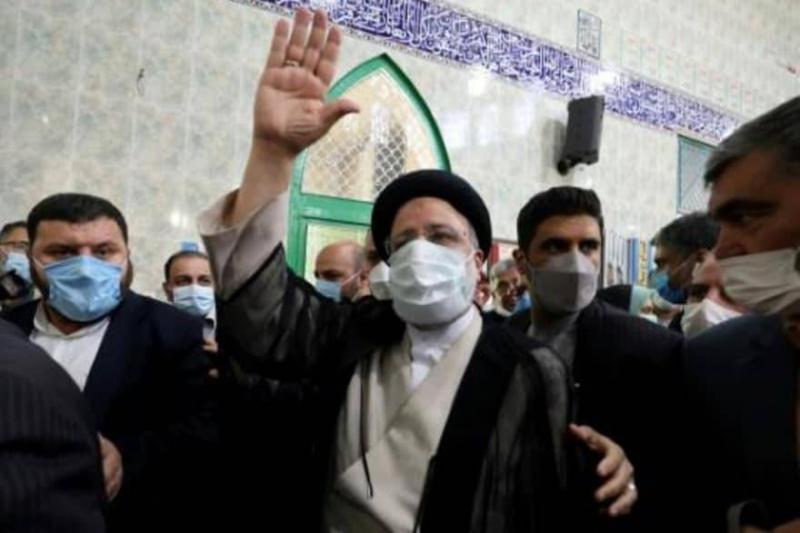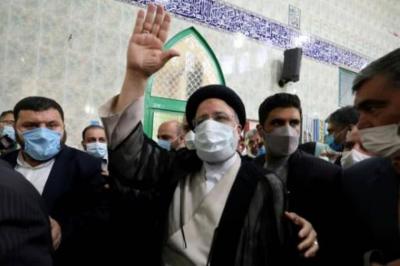Under the title "It Will Not Be Like Rouhani.. Concerns Over Raisi's Impact on Nuclear Negotiations," Alhurra reported on the effects of Ebrahim Raisi's election as president of Iran on the nuclear talks in Vienna. The site highlighted that global powers trying to revive the Iranian nuclear deal warned of complications on the path to reaching an agreement after the cleric Raisi's victory.
Although analysts expect Raisi to agree to reimpose restrictions on Iran's nuclear program, they affirm that he will be more confrontational with the West than his predecessor, current President Hassan Rouhani, according to The Wall Street Journal. They say he will be more resistant to U.S. efforts to limit Iranian military activities in the Middle East.
Anisa Basiri Tabatabai, a fellow at the Royal United Services Institute based in London, said, "There will be continuity in some areas, such as the nuclear deal. However, regarding the broader stance towards the West, Raisi will not provide the same kind of commitment that Rouhani made in terms of cooperation and engagement."
After weeks of discussions, European, Iranian, and American officials made slow progress toward reviving the 2015 deal. Some participants in the Vienna discussions say an agreement could be reached when talks resume next month if Tehran offers concessions and Washington lifts hundreds of sanctions on Iranians, including the new president.
White House National Security Advisor Jake Sullivan stated Sunday that the final word concerning the Iranian nuclear deal rests with Supreme Leader Ayatollah Ali Khamenei, not the president, following the election victory of hardliner Ebrahim Raisi.
Sullivan said in an interview with ABC News: "The final decision regarding a return to the deal hinges on the Supreme Leader," adding, "It doesn't matter who the president is as much as whether their system is willing to commit to limits on their nuclear program."
Raisi won the Iranian presidential election by 62% of the votes, according to final results announced on Saturday, following an election with the lowest turnout in the history of the Islamic Republic.
Iran and the major powers involved in the 2015 agreement have been holding talks in Vienna since early April, seeking to revive the deal from which the United States unilaterally withdrew in 2018 during former President Donald Trump's term, reimposing harsh economic sanctions on Iran.
The talks, which concluded their sixth round on Sunday, aim for Washington to return to the deal and lift the sanctions it reinstated on Tehran, in exchange for Iran's return to its commitments under the agreement, which it gradually rolled back after the U.S. withdrawal.
Sullivan stated, "We still have a long way to go on crucial issues, including sanctions and the commitments Iran needs to make." However, he added, "The arrow is pointed in the right direction. We will see if Iranian leaders are willing to make the hard choices."
European diplomat Enrique Mora, who heads the joint committee for nuclear negotiations in Vienna, told reporters, "We are closer to an agreement, but we have not yet arrived." Mora indicated that he expects the next round to see delegations return from their capitals with clearer instructions and more precise ideas on how to finalize the agreement.
Mora mentioned that the upcoming seventh round would also provide a "clearer idea" of the "new political environment" in Iran, despite noting that discussions continued regardless of the elections.
Iran's Deputy Foreign Minister and head of its delegation to Vienna, Abbas Araqchi, stated, "The important outstanding issues require serious decisions within the capitals, especially in the countries that are parties to these negotiations," according to the Islamic Republic News Agency (IRNA).
He added, "We are now closer to an agreement than ever before. But narrowing the distance between us and the agreement is not easy." Some Western diplomats believe that Iran has been stalling in the months-long talks to ensure the outgoing reformist government does not take credit for restoring the agreement and lifting U.S. sanctions before the elections. These diplomats say that with the defeat of reformists in Iran, the revived deal could be reached quickly.
Western officials have confirmed that Iran continues to present demands that the Biden administration cannot accept. These include reparations from the U.S. for withdrawing from the deal as well as assistance in reviving the type of international investment and trade deals that collapsed or failed to materialize after the U.S. reinstated sanctions.
American diplomats are also examining the sanctions imposed on dozens of high-ranking Iranian officials, some of whom are accused of violently suppressing domestic opposition and extrajudicial killings. Iran has already pressed in the talks for Raisi to be removed from the sanctions list. U.S. officials state that the matter is under discussion. If the sanctions remain in place, Raisi will be the first Iranian president to be sanctioned by the United States while in office.




